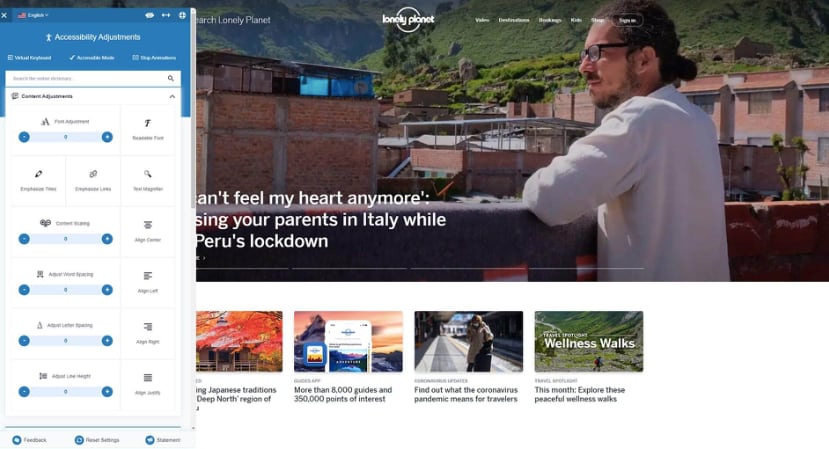Small businesses turn to AI to avoid ADA website accessibility lawsuits

Small businesses are in a bind. Building a fully accessible site is highly expensive for SMBs. At the same time, ADA lawsuits are rising against businesses that have non-accessible websites. The supreme court decision upholding a ruling against Domino’s pizza for having a non-accessible site set a precedent that disabled rights of access extend into the non-physical sphere, namely to websites as well as physical stores.
Moreover, in order to fight the COVID-19 pandemic, the online sphere has become even more essential. From having access to information and news, to working from home by using cloud-based technology, or shopping online for groceries – businesses offering these online services must ensure their websites are accessible to people with disabilities, or they’d be taking the risk of being exposed to potential lawsuits.
Why does website accessibility matter?
Simply put, it matters to serve the needs of all consumers, not just the able-bodied. 15-25% of the world’s population has some sort of disability. That includes people who are visually impaired, legally blind, physically disabled, or for one reason or another struggle to click a mouse on a tiny button. They all need accommodations like screen readers, keyboard-navigable drop-down menus, easy ways to enlarge font without losing the content, etc.
Added to this is the fact that we increasingly live our lives online. The internet is how we order cabs, book doctors’ appointments, and order pizza. There’s a big risk that people who can’t use the internet in typical ways will become cut off from the rest of society, incapable of ordering dinner, accessing medical advice, or even socializing with friends.
History reveals that societies which only cater to the strongest members end up falling. As individuals, we each have an obligation to think about ways to open up our society so that it’s suitable for every person living within it.
What’s more, it’s important to consider that every one of us is likely to need an accessible website at some point in our lives. Someone might break their arm and be unable to use a mouse; use their tablet in noisy surroundings where they can’t hear audio, or in bright sunlight when the glare makes it difficult to see the contrast of link text.
After an operation, when we’re ill, or in old age we can all struggle to click on small buttons. Website accessibility is not just about people with disabilities.
If that’s not a good enough reason, think about your bank balance. Lawsuits are increasing, as the ADA Title III federal lawsuit numbers in 2019 topped 11,000 for another all-time record.
Website accessibility is a big challenge for small business
All this leaves small businesses in trouble. They aren’t exempt from ADA lawsuits, but they face particular challenges to become ADA-compliant. In the words of accessiBe CEO Shir Ekerling, “Manual accessibility costs too much, sometimes more than the website itself. Therefore, most business owners choose to take the risk of being sued or having to take down their website, rather than deal with the expense of making their website compliant.”
No clear website accessibility standards
It’s not at all clear what is required to become ADA compliant. ADA set standards for physical accessibility, but because it was formulated in 1990, before the prevalence of the web, it didn’t create regulations for website accessibility. Currently, web accessibility best practice is to follow WCAG guidelines. ADA generally push for AA level compliance, but that’s not set in stone.
Best practices are complex
The aforementioned WCAG guidelines are long and complex. Without the support of an expert, it’s hard to be sure you covered everything, and that only increases the cost of compliance. It’s easy to miss a detail, and then you are open to a lawsuit despite your best efforts.
Need expertise in coding to fix a non-accessible website
Even a small ecommerce site contains many pages of complicated code. Becoming accessible means fixing hundreds of small details. It’s not a DIY-type of fix; you need to either be a coding expert, or pay for one to do the task.
SMBs can’t absorb the expense
As a result, it’s incredibly expensive to find and then fix, all the accessibility issues in an SMB site. While large enterprises can absorb the cost, SMBs find it crippling.
AI makes accessibility accessible to all businesses
Enter the accessiBe solution. accessiBe uses AI and machine learning to do all the heavy lifting, requiring you to paste just one line of JS code into your CMS. accessiBe uses AI to scan the entire site, noting every accessibility issue, and then automatically adapts the HTML code to solve each one. Ekerling points out that “Business owners want to see things get done quickly. Our job is to make web accessibility simple and automated, so every website can be ADA compliant in a matter of hours, with minimum effort.”

The accessiBe solution has two components that work together to meet WCAG 2.1, ADA title III, and more compliance regulations for accessibility.
The foreground application implements an accessibility interface over the standard website, enabling each user to customize display elements like size and scaling, background and text color, font, line and letter spacing, cursor size and color, mouse hover emphasis, and more, without affecting the regular site in any way. It also opens a virtual keyboard, and an accessible dictionary for the cognitively impaired.
The background application works on a code level to make the site fully navigable by keyboard for the motor impaired. It also modifies HTML code to automatically replace simple HTML codes with the ARIA attribute labels and role tags that screen readers use to provide full context to blind users.
accessiBe utilizes AI and OCR (optical character recognition) technology to add full alt image texts to every image. It can recognize, differentiate, and remedy every type of form for easy completion; and corrects ARIA attributes and role tags for dropdown menus. Despite all these changes, accessiBe doesn’t interfere with any SEO tags or existing manual accessible work. Ekerling explains “We’ve built our product during 18 months of intensive development work with people with disabilities, in collaboration with a lead developer at JAWS team, web accessibility experts and legal advisers.”
By tracking intentional behaviors, scanning the website structure, and comparing the site HTML with an existing database of millions of datasets of elements and site structures, accessiBe uses machine learning to visualize and interpret the site interface like a sighted user, even if the elements are coded as plain text or lists.
accessiBe automatically scans the site again and updates the interface every 24 hours, making sure that it remains compliant even after software updates and the addition of new content.
Thanks to AI, pricing is far lower, making accessible websites possible even for SMBs on a tight budget. The result is far more cost-effective than a manual solution, far more effective than a cheap plugin that doesn’t provide compliance, and far, far better than getting sued for lack of website accessibility.
“Before accessiBe, you had to hire a full-stack web developer and accessibility expert to work dozens of hours on your site to make it accessible,” notes Ekerling. “This cost tens of thousands of dollars, took weeks to implement, and required constant maintenance. The only way to make the entire web accessible is by utilizing AI to make the process simple, efficient and affordable to all. AI and machine learning give us scale and speed, and because it’s automated it dramatically cut costs for business owners.”
AI helps SMBs avoid getting sued
SMBs are stuck between a rock and a hard place. The increasing need to use the internet in daily life, together with the rising wave of ADA-compliant lawsuits, means SMBs have no choice but to make websites accessible, despite the expense. They can’t afford to make an accessible website, but also can’t afford not to.
AI comes to the rescue in the form of accessiBe, making it possible for SMBs to afford ADA-compliant website accessibility that lets you grow your business without fear of lawsuits.
Have you read?
# Richest Women In The World For 2020
# Africa’s Billionaires: Richest People In Africa, 2020
# Most economically influential cities in the world, 2020
# The World’s Best Cities For Luxury Shopping, 2020
# World’s Best Countries To Invest In Or Do Business For 2020
Bring the best of the CEOWORLD magazine's global journalism to audiences in the United States and around the world. - Add CEOWORLD magazine to your Google News feed.
Follow CEOWORLD magazine headlines on: Google News, LinkedIn, Twitter, and Facebook.
Copyright 2025 The CEOWORLD magazine. All rights reserved. This material (and any extract from it) must not be copied, redistributed or placed on any website, without CEOWORLD magazine' prior written consent. For media queries, please contact: info@ceoworld.biz









